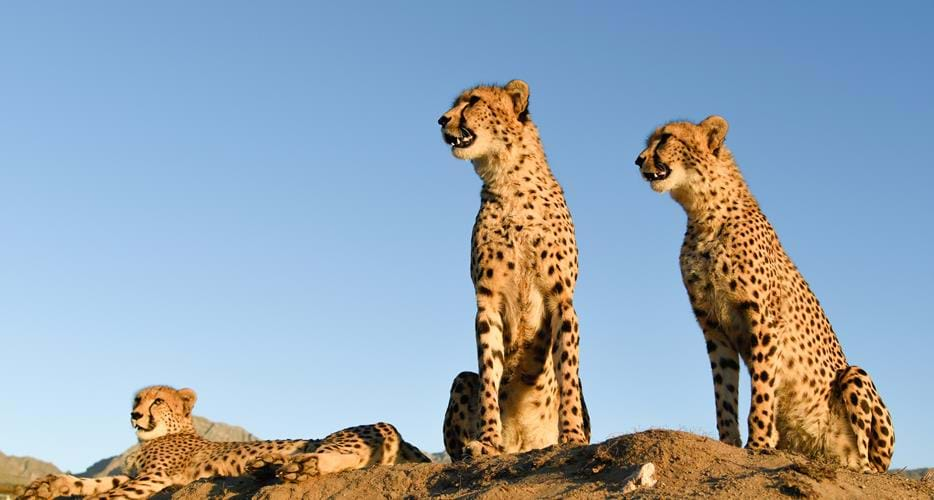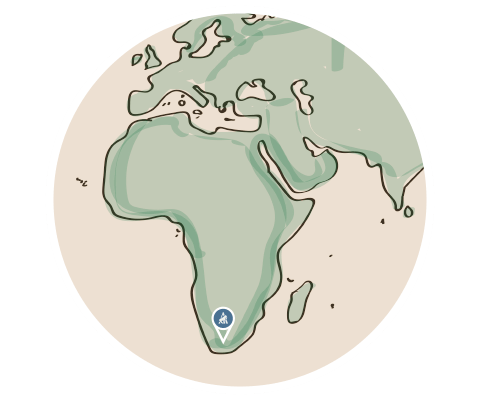
Our Work in South Africa
Our work in South Africa started in 1995 with our first reintroduction of eastern black rhino. We then became the first charity to send a brown hyena born in the UK back to Africa. In more recent years we have rescued elephants, giraffes and antelopes and have achieved another world first in conservation by sending a pair of UK born cheetahs back to the wild.
What are we doing here
Key Milestones
Did you know that...
What are we doing here
South Africa is our newest overseas project for
1. Reintroduction in the wild
We are working to habituate as many captive born species as possible to their native lands in South Africa and beyond. The Aspinall Foundation is the first organisation in the world that to reintroduce in their natural habitat 2 cheetahs (Saba and Nairo) and a brown hyena born in the UK at Port Lympne Reserve.
2. Wildlife protection
The Aspinall Foundation works with a number of partners in South Africa to rescue and relocate wild animals. In 2019, we collaborated with local partners and international conservationists to rescue 13 elephants, 4 giraffes, 19 Cape buffalo and 29 wildebeest from a barren, half-abandoned reserve in South Africa’s Eastern Cape. The rescued animals were all safely translocated to safe new homes within hours. Read more.
Key Milestones
1. Our work in South Africa began in 1995 with the reintroduction of an eastern black rhino.
2. We are the first foundation in the world to have successfully reintroduced in the wild 4 cheetahs and one brown hyena born in captivity in the UK.
3. In 2019, we rescued 13 elephants, 4 giraffes, 19 Cape buffalo and 29 wildebeest from an abandoned reserve in South Africa’s Eastern Cape and transferred them to a new reserve.
4. In 2021, The Aspinall Foundation, in collaboration with Parc Safari, Imire Rhino and Wildlife Conservation and Ethiopian Airlines, successfully translocated two cheetahs from Canada to Zimbabwe as part of their ongoing Back To The Wild initiative.
Did you know that...
1. The cheetah is the fastest land animal in the world and can reach a speed of 112km or 65.5 miles per hour in just 3 seconds! It's faster than a sports car!
2. The name Rhino comes from 'Rhinoceros' which means "nose horn" referring to the giant horn that grows from their snouts. The reason why rhinos are often victims of illegal pouching is because the horn is still used in traditional folk medicine especially in Asia.
3. Elephants are the biggest land animal in the world. Male African elephants reach a height of 3m and a weigh between 4,000-7,500kg. Another curiosity is that their tusks continue to grow so if you see an elephant with very long tusks be sure it's an old one!
4. Giraffes have a very long tongue. It can reach the whopping length of 53cm! This helps them pull down the tree leaves.
5. The brown hyena is a subspecies of the more common spotted hyena. It lives predominantly in the southwest corner of Africa and in Namibia it got the Afrikaans name strandwolf (beach dog) because it wanders the seashores for dead seals and other food left by the sea.
Timeline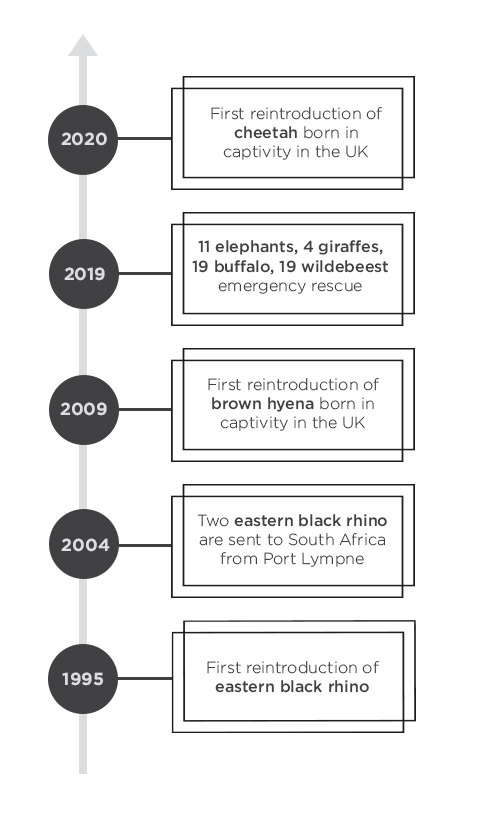
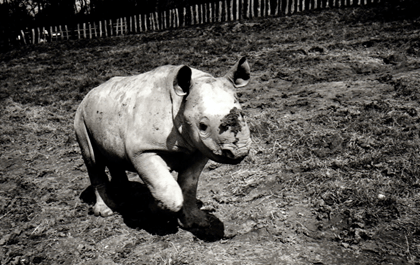
Rewilding Rhino
In 1995 our four year old Port Lympne-bred eastern black rhino, Bwana Kidogo, left Kent for Addo Elephant National Park - a diverse wildlife conservation park situated close to Port Elizabeth in South Africa. In February 2004, two four year old captive bred females made the same journey. All have done well, the females have produced a number of calves between them and Bwana is known to have sired several offspring too.
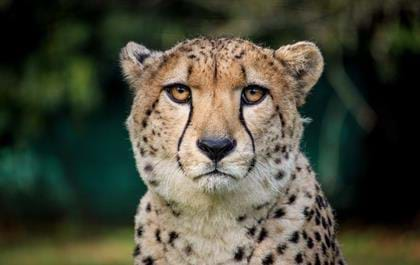
World first for cheetah conservation
The Aspinall Foundation has achieved ground-breaking results in their cheetah rewilding project in South Africa. Saba and Nairo, who were both born in captivity at Howletts Wild Animal Park in the United Kingdom, were translocated to South Africa in February 2020 to start their rewilding journey.
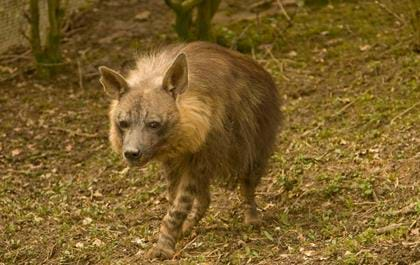
First brown Hyena born in captivity in the UK released into the wild
2013 saw another first for The Aspinall Foundation when Scar, a four year old brown hyena, travelled 7,847 miles to the 6,000 Hectare Sanwild Reserve in Limpopo, South Africa. Born at Port Lympne in 2009, Scar was already famous as he was the first brown hyena to be born in captivity in the UK. Since his release Scar has settled well and is now fully rehabilitated Back to the Wild. Classified as Near Threatened, the brown hyena has been subject to significant persecution by man as they are mistakenly believed to target livestock. We are working to change that.
Species Spotlight

Tana & Kivu
In total, The Aspinall Foundation has reintroduced in the wild 8 eastern black rhinos, 3 in South Africa and 5 in Tanzania which have a total of over 60 descendants. In this picture are Tana & Kivu, the two rhinos who went back to the wild in 2004.
The story of Tana & Kivu
Bwana Kidogo
In 1995 the Aspinall Foundation reintroduced in the wild the first black rhino, Bwana Kidogo. Since then the journey of reintroduction of black rhinos in their natural habitat hasn't stopped and today there are more than 60 descendants of these animals in Africa.

Saba & Nairo
In 2020, this pair of sibling cheetah flew more than 6,000 miles from the UK to a new life in the wilds of their ancestral homeland of South Africa. The cheetah were monitored during their reintroduction in the wild and have found their new home in Mount Camdeboo Private Game Reserve.
Saba & Nairo's story
Kumbe & Jabari
The Aspinall Foundation, in collaboration with Parc Safari, Imire Rhino and Wildlife Conservation and Ethiopian Airlines, successfully translocated two cheetahs from Canada to Zimbabwe to begin their rewilding journey.
Watch their story
Harry and co.
Harry is one of the 11 elephants that were rescued in 2019 from Blaauwbosch Private Game Reserve in the Eastern Cape region of South Africa, together with 4 giraffes, 19 buffalo and 29 wildebeest that were found struggling to find water and food.
Read the story
Azi & Zazu
Brothers Azi & Zazu, a pair of male lion cubs born at Port Lympne Reserve in the UK were rewilded in South Africa.
How You Can Help
Our Projects
Rescues & Translocations in South Africa
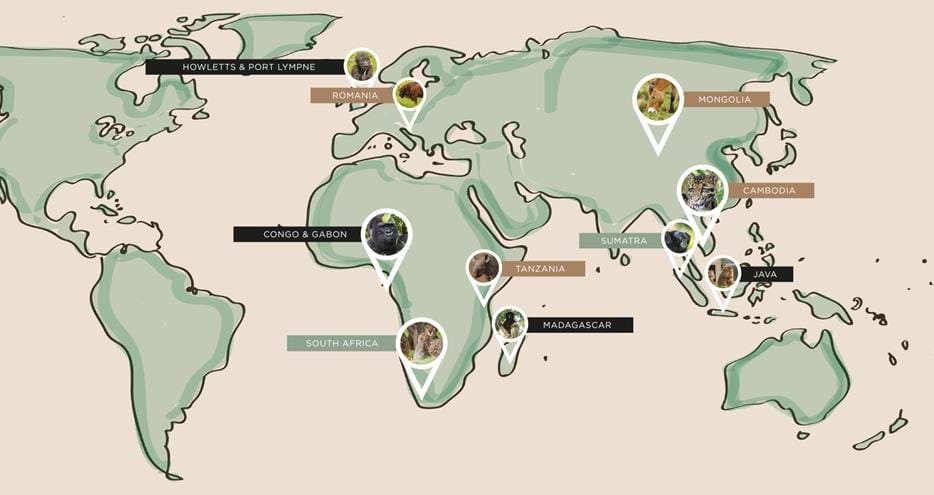
We are proud to be registered with the UK’s Fundraising Regulator.

